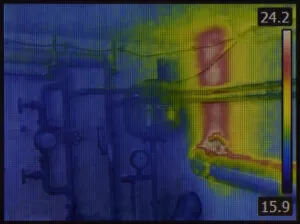If you’re struggling to choose between IP video and analog CCTV, you are not the only one. There are thousands of articles trying to position one as better than the other.
This is a false dichotomy, though. Neither is objectively better than the other—each has its pros and cons, especially in an industrial setting—but one may be better suited to your needs than the other.
We’ve been in the business of producing and selling industrial cameras for more than 50 years. We could tell you that IP cameras are better than analog CCTV in every application and be done with it—the former are more expensive, which is precisely why most articles online try to sell you IP cameras.
However, we haven’t stayed in business for five decades by peddling half-truths. Analog cameras may be better for you, so it makes no sense to pay extra for IP video.
Let’s figure out how to make the right choice for your video monitoring needs.
IP Video Versus Analog CCTV—What’s the Difference?
IP (Internet Protocol) cameras are digital video cameras that send and receive data via an IP network. Much like analog cameras, they come with different capabilities and different designs.
Some IP cameras are equipped to capture and store video footage while others require an NVR (Network Video Recorder) to record video.
Analog cameras are different: They send videos as analog signals to a DVR (Digital Video Recorder). To do that, they need a coaxial cable. The DVR converts the analog signals to digital signals, which allows storing the images on a hard drive.
Don’t worry—you don’t have to remember all these technical terms to choose between IP and analog cameras. You only need to understand what each of them excels at.
What IP Cameras Excel at
IP cameras use newer technology than analog cameras. This means that, if you choose IP cameras, you can expect:
- Higher resolution and better image quality. The resolution of some IP cameras exceeds 4K now.
- Easier integration with your existing systems. If you already have an IP Infrastructure in place, IP cameras are easy to integrate.
- Remote viewing and management. With IP cameras, you can access the video feed and manage the recordings remotely. You can also directly access individual cameras online.
- Increased scalability and better flexibility. Since IP cameras are network-based, it’s easier to add new cameras and scale your system. If you’re currently building your first video monitoring system, this is an important benefit.
What Analog Cameras Excel at
Analog cameras have been around for decades. They are sturdy, reliable, and come with a series of hard-to-ignore benefits:
- Often more affordable. In most cases, high-quality analog cameras are more affordable than low-quality IP cameras. Thus, they are the right choice if you are budget-conscious and don’t need a lot of complex surveillance and analytics features.
- Easier to install and manage. To install analog cameras, you don’t need advanced networking knowledge. They are plug and play and simple to maintain.
- Better compatibility. Since analog cameras are pretty basic, it’s easier to integrate different brands with each other. This is a very useful feature in case you need specialized cameras in specific areas of your facility.
- Low bandwidth requirements. Since these cameras don’t have to be connected to a network, they won’t consume any bandwidth on your existing system. If your network is already strained, analog cameras could be a better option.
How Do You Choose Between IP Cameras and Analog Cameras?
The world of video monitoring is very diverse—there is something for every business need. And this is precisely where you should start, with your business needs.
There’s no right or wrong choice, so start by asking yourself these questions:
- Do you have an IT infrastructure that can support the bandwidth that IP cameras require?
- Will you be using the extra features IP cameras come with?
- Do you need a higher resolution than 1080p high definition?
- What are your needs beyond surveillance—process optimization, NDAA compliance, worker safety enhancement?
- What is your video monitoring budget? You might have to choose between installing fewer IP cameras (and adding more with time) and installing as many analog cameras as you need.
The answers to these questions will dictate the cameras you need. Still not sure what the best option for your business is? Reach out to our video monitoring consultants—we’d be happy to help you make the right choice for your business needs and your budget.







